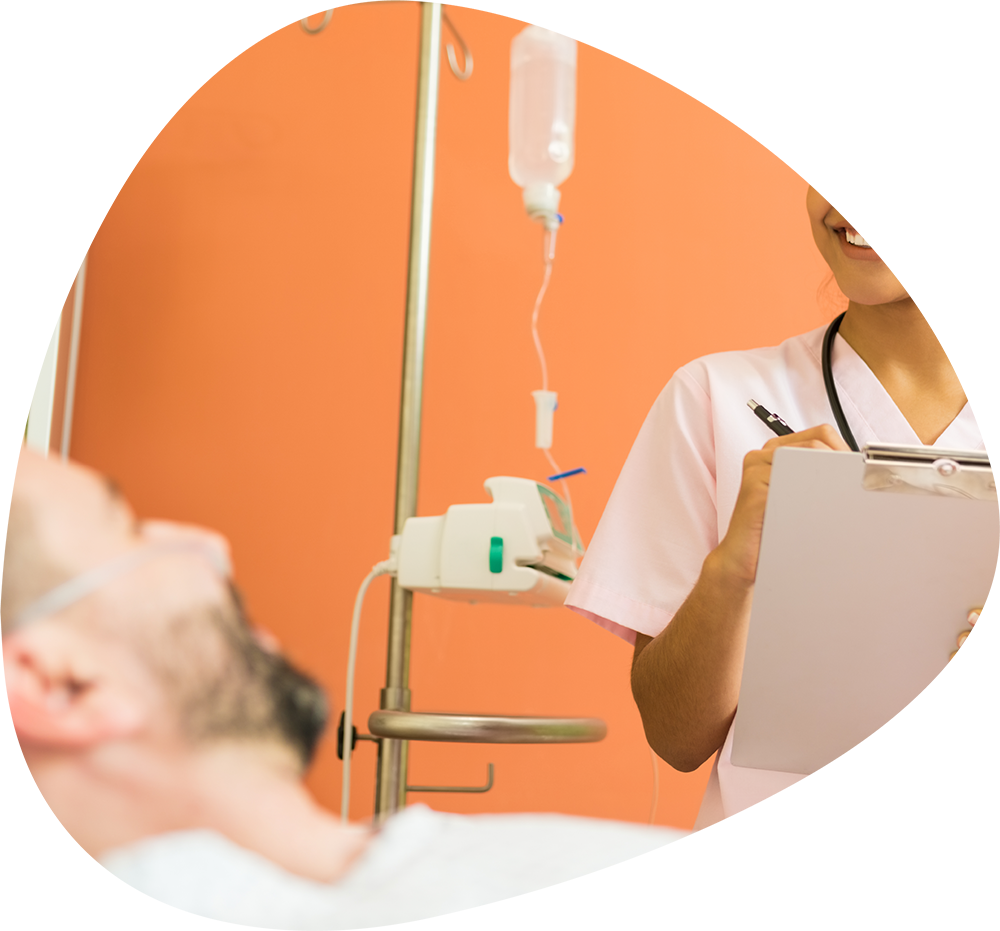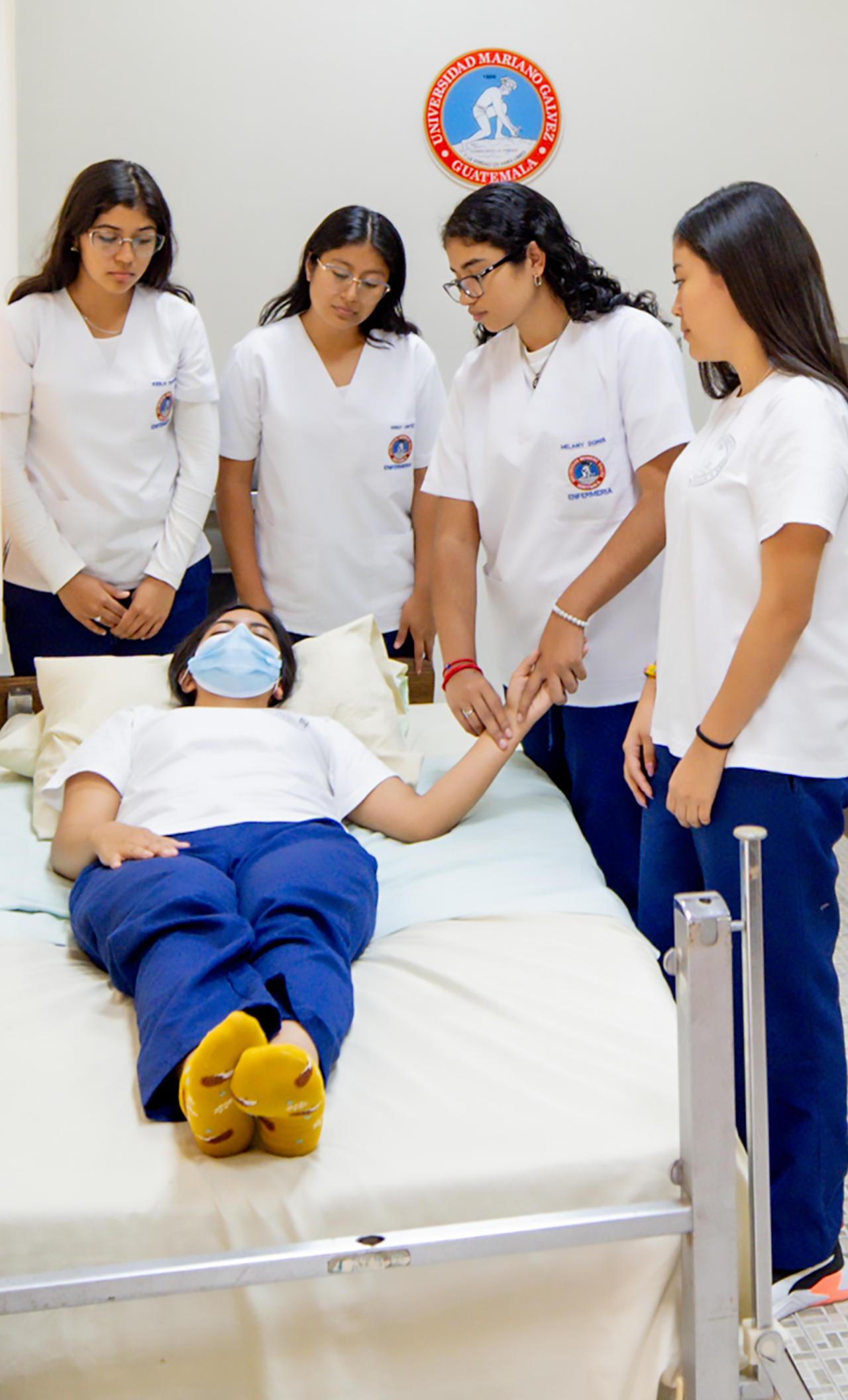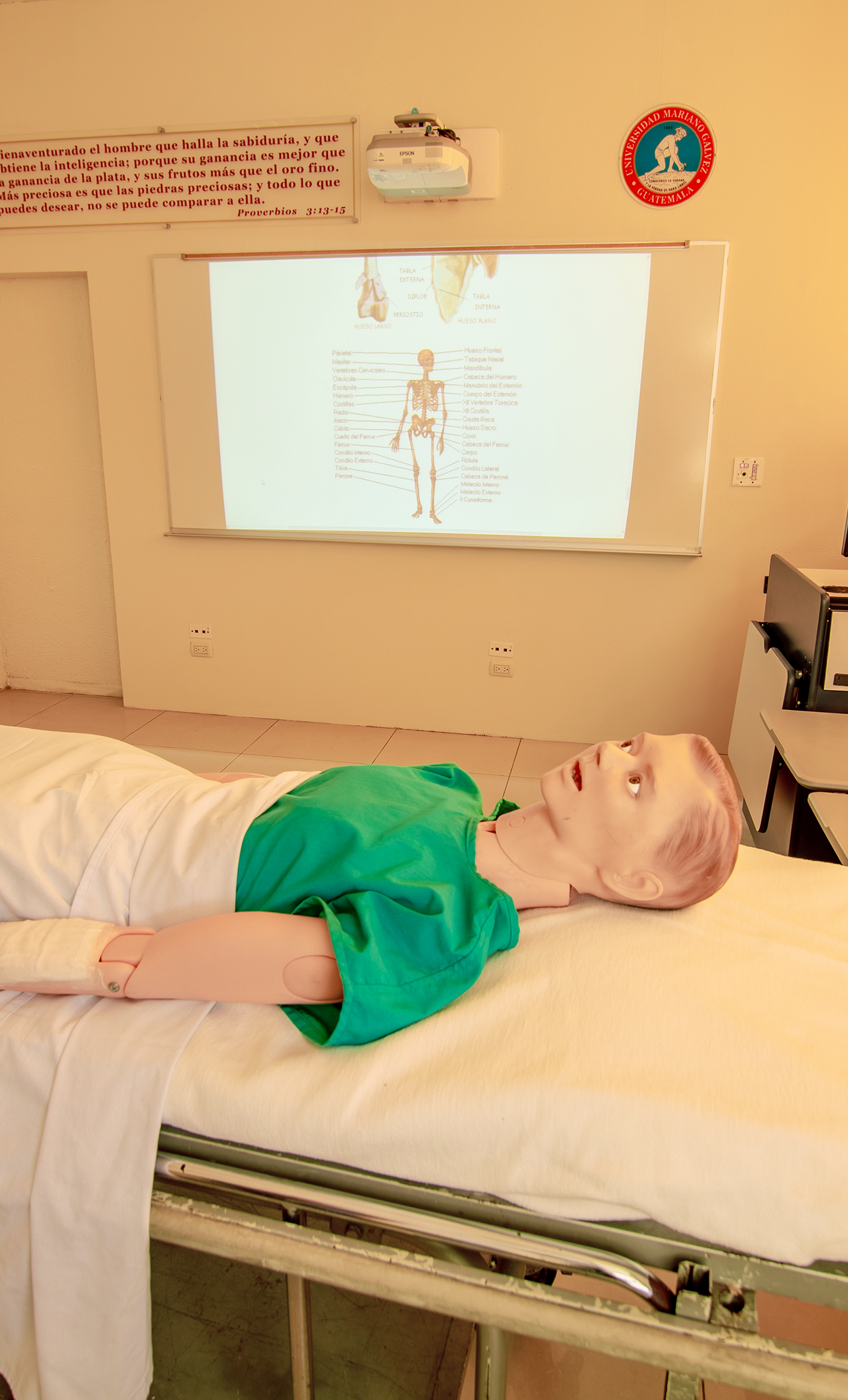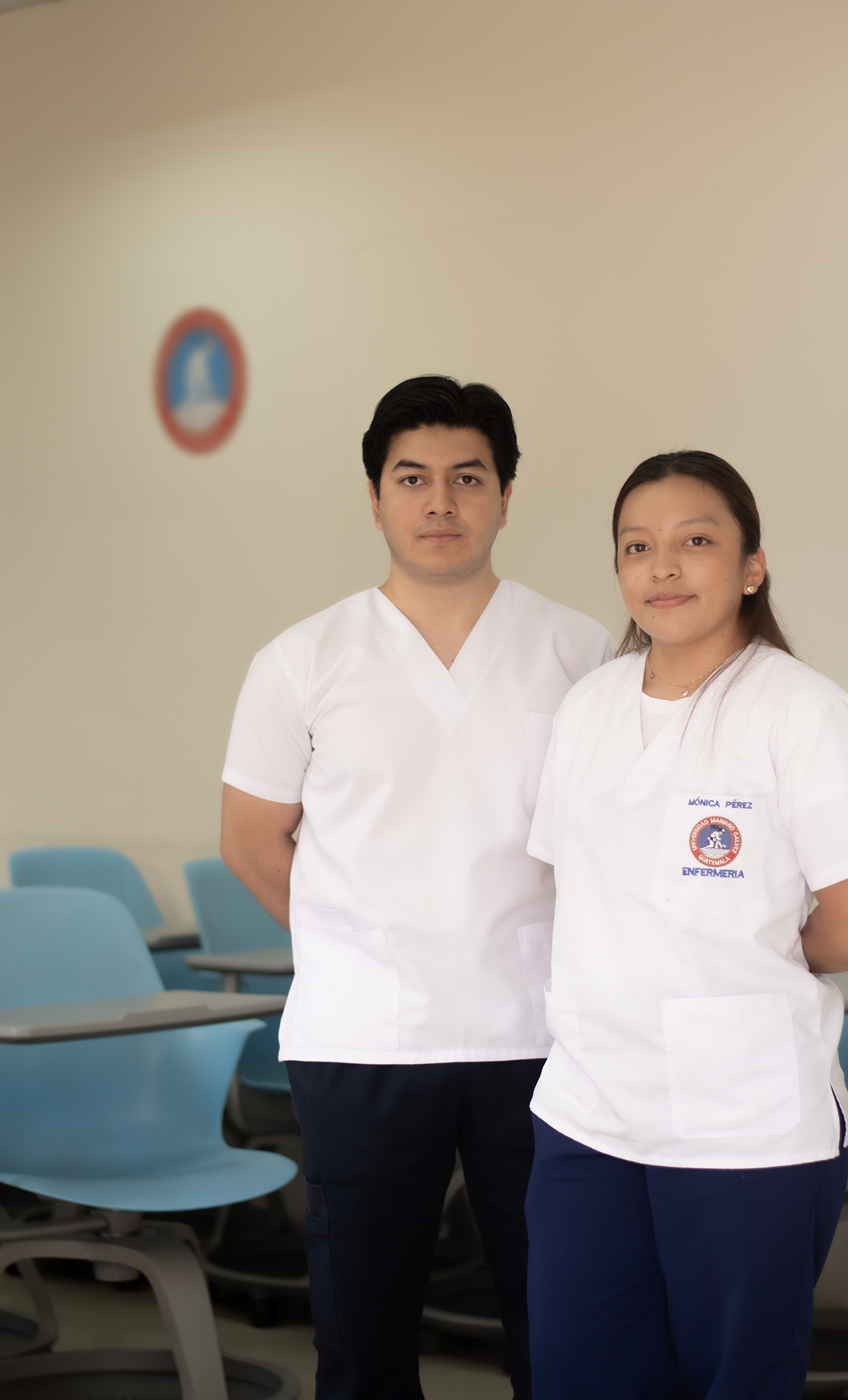
- Bachelor's Degree in
- Nursing
- Degree to be obtained
- Bachelor's Degree in Nursing
- Academic degree
- Bachelor's Degree
- Duration
- 6 years
- Modality
- In-person and virtual
- Schedule:
- Daily Morning and Saturday sessions
- Career description
-
The Bachelor of Nursing is a program that promotes academic excellence through the implementation of a comprehensive curriculum for the education of healthcare professionals in the management of care for individuals, families, and communities. The curriculum includes nursing science, both theoretical and practical, through instruments, processes and discipline-specific work models, as well as other areas related to healthcare, such as research, health management, regulatory frameworks and computer technology.
The curriculum is taught by a highly qualified faculty with both professional and academic background.
- What will you learn during the program?
-
This program offers theoretical and practical skills to provide comprehensive nursing care. Students will learn nursing processes and develop skills to apply health and nursing techniques to actively participate in multidisciplinary work teams.
They will also learn to perform professional nursing healthcare within the legal framework for health, ethical values, and moral principles.
Gallery
AdmissionProfile
Demonstrates a set of characteristics and skills that allow them to develop the expected graduation profile as future professionals with a Bachelor's Degree in Nursing.
Vocation and commitment:
Shows a clear vocation for service and a strong commitment to the care and well-being of people.
Shows empathy, respect, and sensitivity to the needs of others.
Exhibits genuine interest in the health sciences and the scientific field in general.
Willing to acquire solid knowledge in biology, anatomy, physiology, microbiology and other areas related to nursing.
Humanistic training:
Possesses humanistic training that reflects a commitment to ethical values, moral principles, and respect for cultural diversity.
Willing to provide comprehensive care with a transcultural approach, attending to the particularities of each individual.
Critical thinking skills:
Holds critical thinking skills, can to analyze complex situations and make fundamental decisions.
Can reflect on their practice and constantly seeks improvement in nursing care.
Research skills:
Shows interest and aptitude to develop health and nursing research skills that will enable them to use scientific evidence to inform their actions and practices in the nursing field.
Graduate'sProfile
Professional who possesses solid scientific, humanistic, and specialized knowledge.
Uses knowledge of the nursing sciences and other related sciences to provide and conduct nursing care with quality and warmth, as well as socio anthropology to provide comprehensive care with a transcultural approach, within the legal framework of the country's health, to minimize the vulnerability of resorting to legal ethical implications, strengthens ethical values and moral principles in professional practice and in personal life.
Applies critical judgment and strategic thinking in the work at different levels and situations where he or she works, develops plans, programs, and projects according to institutional needs and requirements.
Develops skills to apply techniques in health and nursing research, uses theories and nursing models that strengthen the health and nursing care provided, in addition to other instruments and work processes, to actively participate in multidisciplinary work teams.
Uses knowledge of epidemiology, statistics, and administration alongside advanced technology in the development of professional duties.
Conducts educational processes for users and for the formation of human resources in nursing.
Evidences union identity and integral development that strengthens his or her competence.
Career Opportunities

Graduates of the School of Nursing are healthcare professionals with solid scientific and humanistic knowledge for managing the care of individuals.
They can excel in the field of healthcare in institutions such as:
Public and pivate hospitals
Ministry of Health
Social Security Institute (IGSS)
Private clinics
Government Ministries
Curriculum
| 1° Ciclo | ANTROPOLOGÍA SOCIAL | BIOLOGÍA GENERAL | DESARROLLO HUMANO | EDUCACIÓN PARA LA SALUD | FUNDAMENTOS DE QUÍMICA | LÓGICA MATEMÁTICA |
|---|---|---|---|---|---|---|
| 2° Ciclo | ANATOMÍA HUMANA | BIOQUÍMICA | ENFERMERÍA COMUNITARIA | ENFERMERÍA HOSPITALARIA | FISIOLOGÍA HUMANA | |
| 3° Ciclo | ENFERMERÍA EN LA ATENCIÓN AL NIÑO Y ADOLESCENTE | ESTADÍSTICA GENERAL | FARMACOLOGÍA | SALUD MENTAL | VIGILANCIA EPIDEMIOLÓGICA | |
| 4° Ciclo | ENFERMERÍA MATERNO-INFANTIL | MEDICINA ALTERNATIVA | METODOLOGÍA DE LA INVESTIGACIÓN | MICROBIOLOGÍA Y PARASITOLOGÍA | NUTRICIÓN | |
| 5° Ciclo | ADMINISTRACIÓN DEL CUIDADO HOSPITALARIO | ATENCIÓN AL PACIENTE GERIÁTRICO | GESTIÓN Y ADMINISTRACIÓN DE SERVICIOS PREVENTIVOS DE SALUD | INTRODUCCIÓN A LA ADMINISTRACIÓN | PROMOCIÓN DE LA SALUD | |
| 6° Ciclo | PRÁCTICA COMUNITARIA | PRÁCTICA MATERNO-INFANTIL | PRÁCTICA MEDIO QUIRÚRGICA | PRÁCTICA PEDIÁTRICA | ||
| 7° Ciclo | PRÁCTICA SUPERVISADA COMUNITARIA | PRÁCTICA SUPERVISADA HOSPITALARIA | ||||
| 8° Ciclo | ÉTICA PROFESIONAL | GERENCIA EN SALUD | TEORÍAS Y MODELOS DE ENFERMERÍA | |||
| 9° Ciclo | GESTIÓN DE CALIDAD | INFORMÁTICA APLICADA A ENFERMERÍA | LEGISLACIÓN EN SALUD | |||
| 10° Ciclo | BIOESTADÍSTICA | ECONOMÍA Y REALIDAD NACIONAL | INVESTIGACIÓN | |||
| 11° Ciclo | DISEÑO Y FORMULACIÓN DE PROYECTOS | ECOLOGÍA E INTERCULTURALIDAD | TRABAJO DE GRADUACIÓN I | |||
| 12° Ciclo | EPIDEMIOLOGÍA | SALUD PÚBLICA | TRABAJO DE GRADUACIÓN II | |||
| 13° Ciclo | SEMINARIO DE ÁREA CULTURA GENERAL | SEMINARIO DE ÁREA DE APLICACIÓN | SEMINARIO DE ÁREA TÉCNICA METODOLÓGICA |


